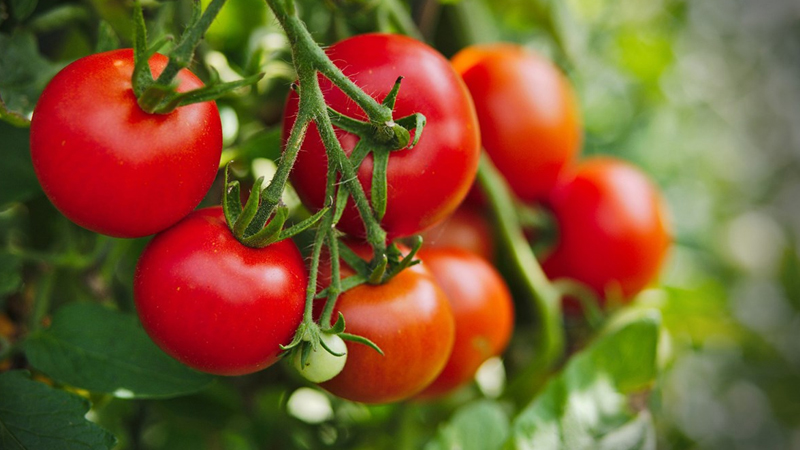Nutritional Value of Tomatoes
The highest percentage in tomatoes is 95% water, and the remaining 5% consists mainly of carbohydrates and fiber. In 100 grams of raw tomatoes, the nutritional composition includes the following: 18 kcal, 0.9 grams of protein, 3.9 grams of carbohydrates, 2.6 grams of sugar, 1.2 grams of fiber, 0.2 grams of fat…

The carbohydrates in tomatoes include simple sugars, such as glucose and fructose, which account for nearly 70% of the carbohydrate content.
Fiber: Provides around 1.5 grams in each medium-sized tomato. 87% of the fiber in tomatoes is insoluble fiber, in the form of hemicellulose, cellulose, and lignin.
Vitamins and minerals: Tomatoes are a rich source of vitamins and minerals. Vitamin C, an essential nutrient and antioxidant, can be supplied to the body by consuming one medium-sized tomato, providing about 28% of the recommended daily intake (RDI). Potassium, an essential mineral, is beneficial for blood pressure control and heart disease prevention. Vitamin K1, or phylloquinone, plays a vital role in blood clotting and bone health.
Folate (Vitamin B9), one of the B vitamins, is important for normal tissue growth and cell function. It is especially crucial for pregnant women.

Who should limit tomato consumption?
People with joint inflammation
Eating too many tomatoes can cause joint pain. The reason is that tomatoes contain solanine, an alkaloid that causes calcium buildup in the tissues. Excessive calcium buildup can lead to inflammation, pain, and swelling in the joints.
People with digestive issues
Tomatoes contain high levels of acid, and consuming them in large quantities can cause reflux and heartburn. Individuals with gastritis or acid reflux should avoid eating tomatoes.
Even in healthy individuals, consuming excessive amounts of tomatoes or tomato sauce can cause a burning sensation.
People with kidney issues
According to Medical Daily, tomatoes are rich in oxalates. This is a compound that is difficult to metabolize when consumed in excess. Along with calcium accumulation in tissues, this can lead to kidney stones.
In addition, the abundant potassium content in tomatoes can impair kidney function.
People prone to allergies
Tomatoes contain histamine, a compound that boosts the immune system to fight against external agents. This often leads to allergic reactions such as rashes, tongue and facial swelling, sneezing, and throat irritation.
In individuals diagnosed with tomato allergy, the symptoms can be even more severe.
People with autoimmune diseases
Tomatoes belong to the nightshade family. Alkaloid compounds in tomatoes can exacerbate inflammation in the body, which is particularly harmful for individuals with autoimmune diseases. Many people with these conditions have eliminated nightshade foods from their diet and report significant improvements in their health.
People with urinary issues
Acidic foods like tomatoes can irritate the bladder. If you experience involuntary urination or urinary issues, it is best to avoid or reduce consumption of these foods.
Individuals with digestive issues: The high acid content in tomatoes can trigger reflux and heartburn, so those with gastritis or acid reflux should limit consumption.
People with kidney issues: Tomatoes are rich in oxalates, which can be difficult to metabolize in excess and may contribute to kidney stone formation, especially with the additional calcium accumulation. The high potassium content can also impact kidney function.
Those prone to allergies: Tomatoes contain histamine, which often leads to allergic reactions like rashes, swelling, sneezing, and throat irritation.
Individuals with autoimmune diseases: The alkaloid compounds in tomatoes can exacerbate inflammation, and nightshade vegetables (including tomatoes) are often eliminated from the diets of those with autoimmune conditions.
People with urinary issues: Acidic foods like tomatoes can irritate the bladder and trigger involuntary urination, so it’s best to limit consumption if you experience these issues.


































